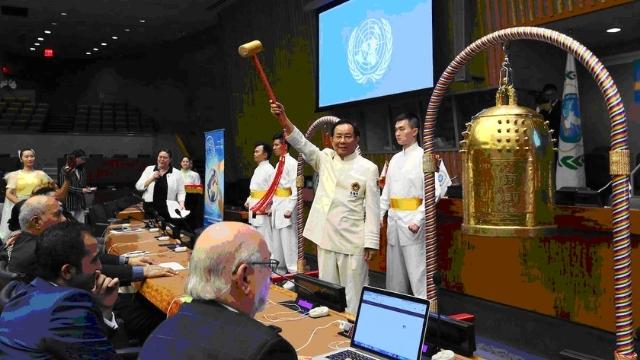11/27/2021CHEN YI-JING A+ | A-
A background of Tai Ji Men’s origins, action, and mission, and a discussion of the Tai Ji Men case as a FORB problem.
by Yi-Jing Chen*
*A paper presented at the mid-term conference of the Research Committee on Sociology of Religion (RC-22) of the International Sociological Association, Vilnius, Lithuania, November 11–14, 2021.

Tai Ji Men is an ancient menpai (similar to a “school”) of qigong, martial arts and self-cultivation, organized as an international non-profit cultural and spiritual organization. The culture of Tai Ji Men is deeply rooted in Tao wisdom. In response to a calling to bring both physical and spiritual health to modern society, the contemporary Zhang-men-ren (grandmaster) of Tai Ji Men, Dr. Hong Tao-Tze, also called its shifu, established Tai Ji Men Qigong Academy in 1966, and successively founded academies in both Taiwan and the United States.
In response to the theme of this conference, my study includes the following three aspects:
1. Background of the movement of An Era of Conscience (ANEOC) and the UN International Day of Conscience (April 5) promoted by Tai Ji Men.
2. Tai Ji Men’s action and mission to promote a culture of conscience for love and peace in the world.
3. Tai Ji Men case as a case study of problems involving freedom of religion and belief (FORB).
In 2014, Tai Ji Men Qigong Academy, the Association of World Citizens (AWC) and the Federation of World Peace and Love (FOWPAL) jointly launched the global Movement of An Era of Conscience (ANEOC).
The initiator of the movement, Dr. Hong Tao-Tze, the Zhang-men-ren of Tai Ji Men and president of FOWPAL stated, “Kind intentions and good hearts are the positive energies necessary to safeguard the earth’s sustainable development.” In response to the United Nations SDG four, at the 66th UN DPI/NGO Conference in South Korea in 2016, Dr. Hong delivered a speech, “Hope for Global Citizens: Conscience, Education and Culture,” contending that conscience, culture and education are the three crucial elements for sustainable development. He believes that good culture enables good education; in turn, good education nurtures the culture of good virtues. When quality education and culture are nourished with conscience, true global citizens will be cultivated and a sustainable future achieved, facilitating the attainment of the 2030 Agenda.

In February 2019, Dr. Hong and members of FOWPAL launched a global endorsement campaign for the Declaration of the International Day of Conscience at the United Nations in New York City. The initiative was praised by offices of the United Nations and the heads of state of several countries, and eventually led the U.N. to proclaim April 5 as the “International Day of Conscience,” the 166th U.N. day of observance. After years of efforts, as of April 5 this year, which was the second International Day of Conscience, the Declaration of the International Day of Conscience has been signed and recognized by people from more than 195 countries.
Over the years, Dr. Hong and Tai Ji Men dizi have visited over 300 cities in 101 countries to promote the ANEOC movement and the International Day of Conscience through multiple interactive events such as cultural exchanges, ringing the Bell of World Peace and Love, “wisdom dialogues,” participation in many UN events as a non-governmental organization, including the 2002 World Summit on Sustainable Development in South Africa, and the 2012 Rio+20 UN Conference on Sustainable Development in Brazil, forum announcements, and the promotion of the Declaration of Conscience, etc., which have received the support of many international heads of state and leaders. The ANEOC movement is a lifelong education for world citizens, in line with SDGs Goal 4 and Goal 17 partnership for all.
Through practical actions, the movement aims to raise the conscience of citizens and develop a conscience-based culture of education for society that starts from the individual, in order to achieve a pro-ecological and spiritual environment and enhance people’s spiritual health. Conscience, human rights, and sustainable development are closely connected. The core concept of sustainability is that it “must provide opportunities for anyone, anywhere, at any time, to live with dignity in the society in which they live.”
It is undeniable that in a turbulent international situation, people’s rights are extremely vulnerable, even in democratic countries. While Tai Ji Men’s shifu and dizi (disciples) are committed to love and peace, they are also suffering from the 25 year-long human rights persecution involving legal and tax violence and violation of freedom of religious or belief.
Taiwan is known as the country of democracy and freedom in Asia. Yet, what happened to Tai Ji Men is quite ironic and may seem unbelievable.
The Tai Ji Men Case has been just discussed at a side event of the International Religious Freedom Summit in Washington D.C. in July. Ambassador Sam Brownback and Dr. Katrina Lantos Sweet, the co-chairs of the IRF Summit in 2021, both expressed their concerns about the Tai Ji Men case. In the following section, I will take Tai Ji Men case as a case study of FORB problems.
On December 19, 1996, the Taiwan governmental officers carried out a politically motivated crackdown on various religious movements. Prosecutor Hou Kuan-Jen led hundreds of armed police officers on an unwarranted search at all Tai Ji Men Qigong Academy branches and private residences of several Tai Ji Men dizi. Subsequently, the Zhang-men-ren of Tai Ji Men and his wife, and two dizi were detained for several months.

Prosecutor Hou charged the defendants with both fraud and tax evasion. The case was then forwarded to the National Tax Bureau (NTB), which issued tax bills for the alleged tax evasion. The NTB did not carry out the investigation required by its statutory duty, nor waited for the decision of the criminal court to ascertain the nature of the income; it issued heavy tax penalties for tax evasion for years 1991–1996, simply based on the indictment.
Since Tai Ji Men Qigong Academy was established in 1966, the Zhang-men-ren of Tai Ji Men, Dr. Hong, has never been taxed by the NTB. Additionally, the Ministry of Education already explained that Tai Ji Men is not a cram school, contrary to what Prosecutor Hou argued. Why should these six years be treated differently because of the action by Prosecutor Hou?
On July 13, 2007, the Supreme Court found Tai Ji Men not guilty of fraud, nor of tax evasion or violation of tax codes. The Supreme Court also determined that the red envelopes given by his disciples to the shifu were gifts by nature and were tax-free income under the Income Tax Act (Taiwan). In 2019, although the NTB corrected five of the six years of the taxes it had assessed to zero, it still violated the principles of consistency and equality by maintaining the tax bill for the year 1992 only, treating it as an alleged cram school tuition.
Over 25 years, Tai Ji Men has followed legal procedures to seek administrative remedy. In 2010, at a public hearing in the Legislative Yuan, the Ministry of Finance promised to revoke the tax bills and withdraw their enforcement within two months. However, the tax bills continued to be issued in violation of the promise.
In 2011, the Executive Yuan held an inter-ministerial meeting and resolved to revoke the tax bills if a survey among Tai Ji Men dizi would show that the red envelopes given to the shifu included gifts (rather than tuitions). After a two-month survey, even though 7,401 answers from Tai Ji Men dizi all confirmed that they were indeed gifts, the NTB refused to accept the survey results, and continued to issue ill-founded tax bills to Tai Ji Men.
After that, the unjustified tax bill was transferred to the Administrative Enforcement Agency for enforcement, resulting in the auction and confiscation of sacred land belonging to Dr. Hong and Tai Ji Men by the government in August 2020.
Why did this happen, and the Tai Ji Men lasted for more than 25 years? Why is such a contradictory taxation penalty allowed? How could the NTB forcibly take Tai Ji Men’s land into national ownership?
The Tai Ji Men case has become a human rights indicator case study in freedom of religion and beliefs, and human rights in Taiwan. Many scholars from all over the world have raised their voices in support of Tai Ji Men’s fight for justice, and appealed to the government for a redress of this wrongful case.
In fact, there are two important aspects in this Tai Ji Men case: 1. protection of freedom of thought, belief, and religion; 2. taxpayers’ right to a fair and transparent taxation system and procedures. Although Taiwan ratified the International Covenants on Human Rights as early as 2009, in the Tai Ji Men case I think the Taiwanese government has clearly violated the International Covenants.
Firstly, the Government has violated the principle of equality and nondiscrimination. In Taiwan, no master of martial arts or religious groups has ever been taxed for accepting gifts, in any form, from disciples or followers.
Secondly, the Government has violated the freedom of thought, belief and religion. Tai Ji Men dizi followed an ancient ritual and created a shifu–dizi relationship. Adherence to this old doctrine is part of the culture of a belief or religion, which is protected by both the ICCPR and ICESCR and should be absolutely inviolable.
Thirdly, the Government has violated Tai Ji Men members’ right to cultural engagement. Moreover, the Government has violated Tai Ji Men members’ right to a fair trial. Tai Ji Men’s rights were violated by the government through criminal law and tax law persecution for 25 years.

The book Who Stole Their Youth? recorded the difficulties faced by members of Tai Ji Men with government’s abuse power and bureaucracy.
In the absence of the case, the dizi would have dedicated their positive energy wholeheartedly to helping the world rebuild a culture of conscience, love and peace, and make the world a better place.
On the other hand, the Taiwan government allows the NTB officials to be rewarded with financial bonuses when they issue tax bills in cases of tax evasion, and it was suspected that some officials received bonuses for the 1992 Tai Ji Men tax bill. Therefore, the officials protected each other and were unwilling to correct their mistakes.
This shows that the democratic rule of law in Taiwan has not been truly implemented and valued. There is still room for improvement in human rights and rule of law education in Taiwan, and this highlights why the education of conscience is so important.
The Tai Ji Men case also reveals a clear international trend and shows that the government persecution on minority spiritual and religious groups was carried out by infringing on their property may occur anywhere even in democratic countries.
In conclusion, governments should be very cautious and avoid any form of discrimination and violations of the FORB of religious and spiritual groups. The Tai Ji Men case, which lasted for 25 years, highlights the importance of a government that is guided by conscience, respects the law and procedural justice, and implements human rights protection. This is a lesson that modern democracies should learn from.
As Dr. Hong said, “Only with a conscience can there be love, only with love can there be human rights, and only with human rights can there be real peace.” A conscience-based culture can create a sustainable society of love and peace. This is not only a driving force for world peace and the restoration of the earth’s ecosystem, but also an opportunity for the sustainable survival of human beings and all living creatures.
Source: Bitter Winter
